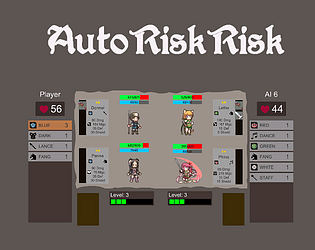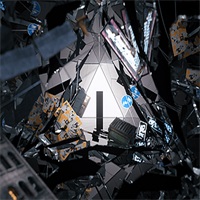AMD Radeon RX 9070: Comprehensive Review
The launch of the AMD Radeon RX 9070 comes at an intriguing time for graphics cards, directly competing with Nvidia's GeForce RTX 5070. Priced at $549, the RX 9070 offers a compelling alternative to Nvidia's latest offering, which has underperformed in the market. This puts AMD in a strong position, making the RX 9070 a prime choice for gamers looking to enhance their 1440p gaming experience.
However, the situation is nuanced. AMD's own Radeon RX 9070 XT, priced just $50 more, presents a dilemma. The RX 9070 is about 8% slower and 9% cheaper than the XT model. While the price difference is mathematically sound, it's challenging to justify not spending the extra $50 for the superior performance of the 9070 XT. Nonetheless, when choosing between these two AMD options, the outlook remains favorable for Team Red.
Purchasing Guide
----------------The AMD Radeon RX 9070 is set to launch on March 6, with a starting price of $549. Be aware that higher-priced models will be available. For the best value, aim to purchase a model as close to the starting price as possible, especially considering its close pricing to the Radeon RX 9070 XT.
AMD Radeon RX 9070 – Photos
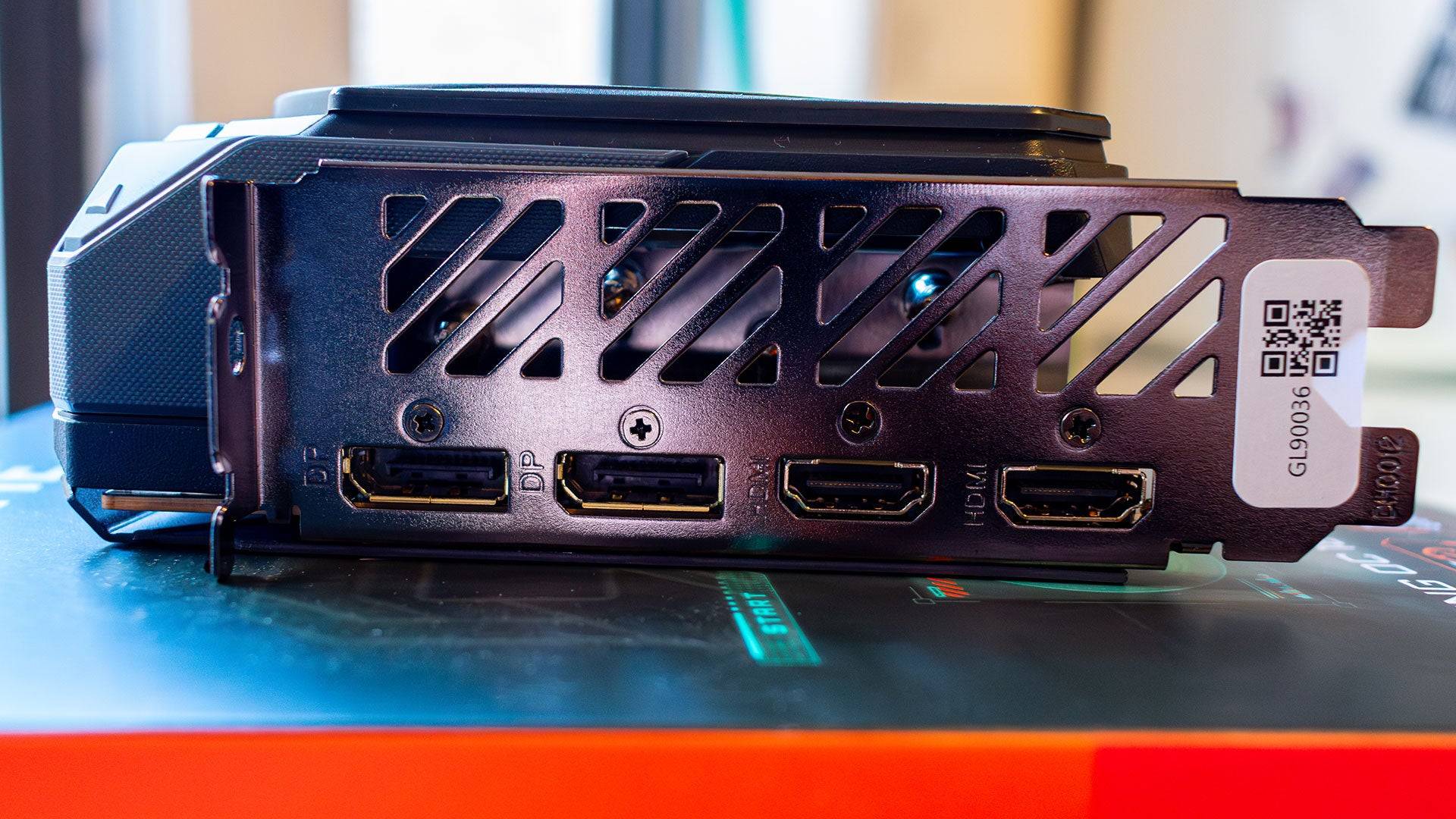
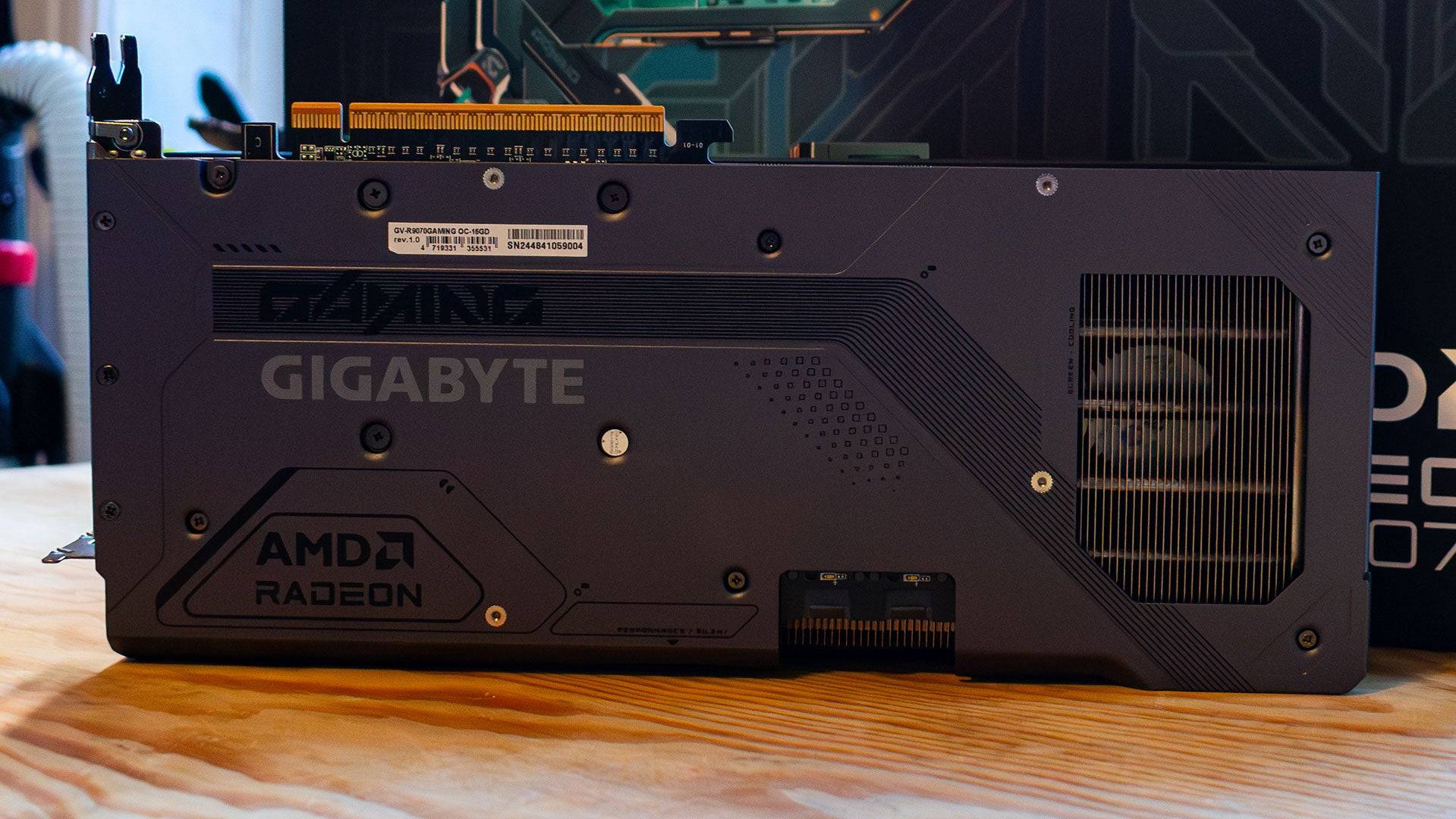 4 Images
4 Images
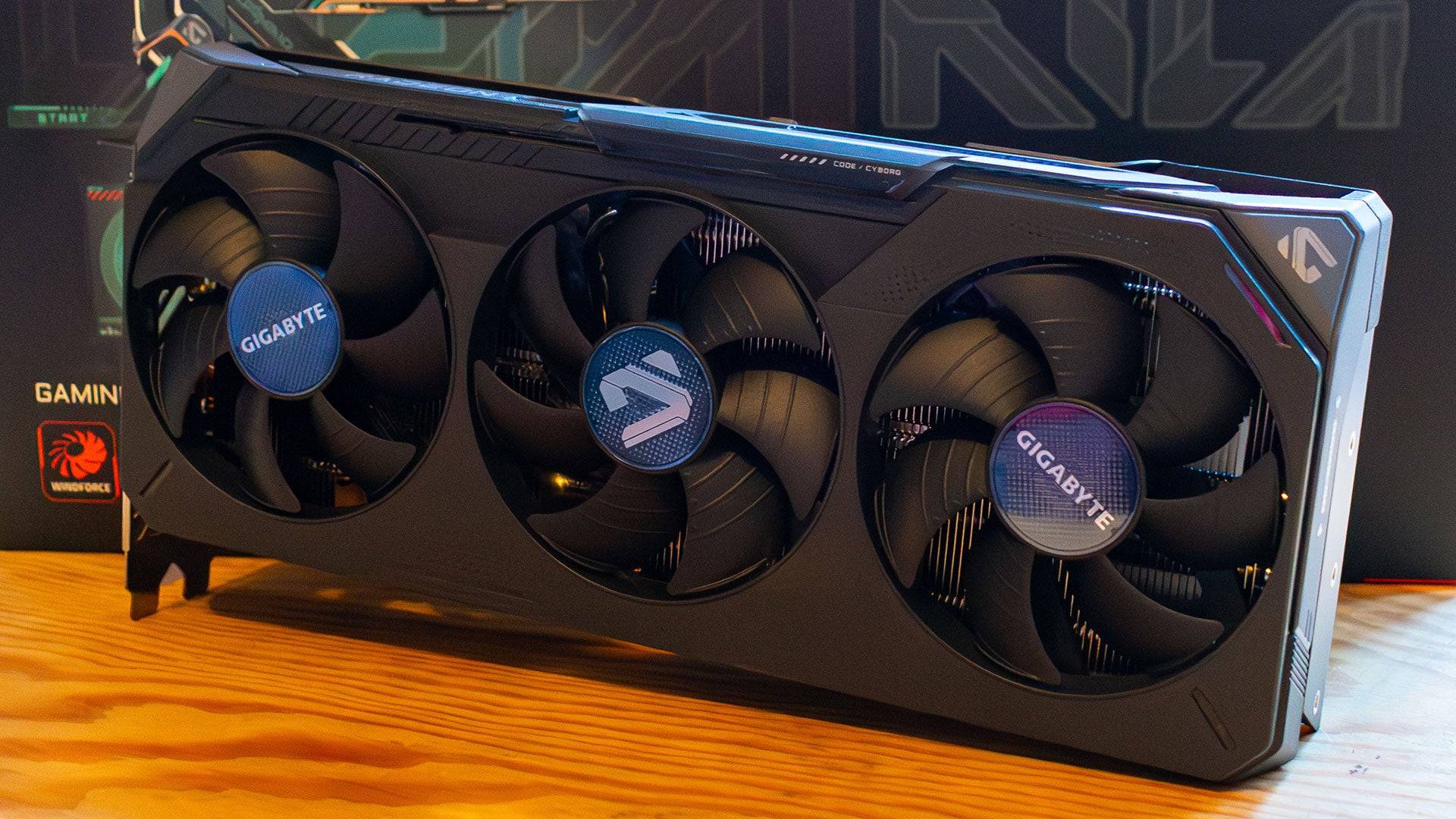
Specs and Features
------------------The AMD Radeon RX 9070, like its XT counterpart, is built on the innovative RDNA 4 graphics architecture. This technology significantly boosts performance, allowing the RX 9070 to surpass the previous generation's Radeon RX 7900 GRE by a wide margin, despite having 30% fewer compute units.
The RX 9070 features 56 Compute Units, each equipped with 64 Streaming Multiprocessors (SMs), totaling 3,584 shaders. Each compute unit also includes one Ray Accelerator and two AI Accelerators, resulting in 56 and 112 total, respectively. These enhancements enable the RX 9070 to excel in games with ray tracing and introduce AMD's FidelityFX Super Resolution (FSR) 4, marking the first time AI upscaling is available on AMD graphics cards.
Similar to the 9070 XT, the RX 9070 comes with 16GB of GDDR6 VRAM on a 256-bit bus, matching the memory configuration of the 7900 GRE. This setup is well-suited for 1440p gaming for years to come. Although GDDR7, as used by Nvidia, would have been a welcome addition, it likely would have increased the price.
AMD recommends a minimum 550W power supply for the RX 9070, which has a power budget of 220W. My testing showed a peak consumption of 249W, suggesting a 600W PSU for safety.
Notably, AMD is not releasing a reference design for the RX 9070, leaving production to third-party board manufacturers. I tested the Gigabyte Radeon RX 9070 Gaming OC 16G, a triple-slot card with a slight factory overclock.

FSR4
----Since the rise of DLSS in 2018, AI upscaling has become a key method for enhancing performance while maintaining image quality. Previously exclusive to Nvidia, FSR 4 now brings AI upscaling to AMD GPUs. FSR 4 uses previous frames and in-game data to upscale lower resolution images to native resolution through an AI model, improving upon the temporal upscaling of FSR 3 by reducing artifacts like ghosting.
However, FSR 4 incurs a slight performance cost. For example, in Call of Duty: Black Ops 6 at 1440p on the Extreme preset, FSR 3 achieves 165 fps, while FSR 4 drops to 159 fps. Similarly, in Monster Hunter Wilds at 4K with ray tracing, the RX 9070 gets 81 fps with FSR 3, but 76 fps with FSR 4.
The Adrenalin software allows users to toggle between FSR 3 and FSR 4, choosing between better image quality or slightly better performance. For single-player games, I prefer FSR 4, but for fast-paced online games like Marvel Rivals, FSR 3 might be more suitable.
AMD Radeon RX 9070 XT & 9070 – Benchmarks
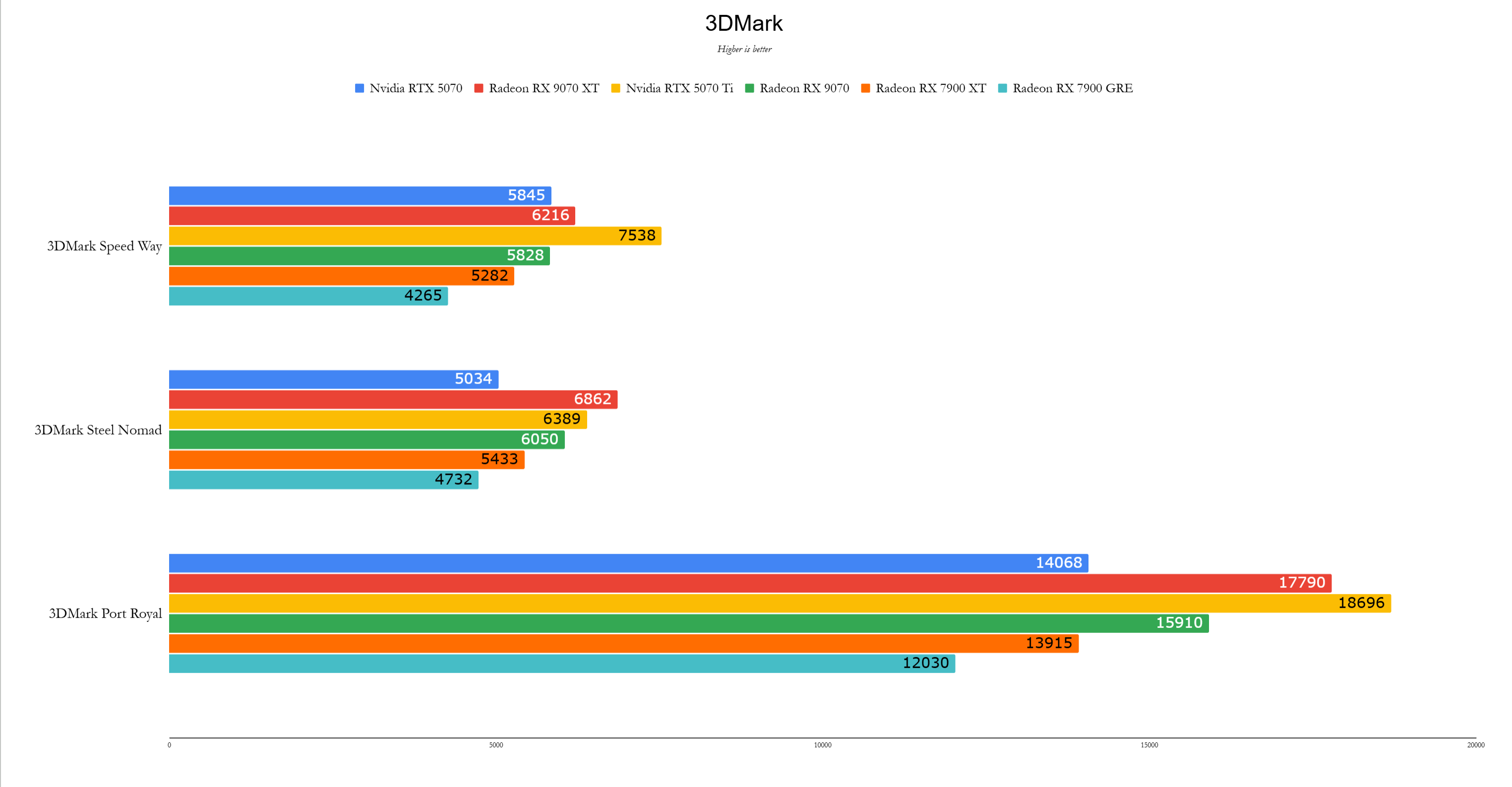
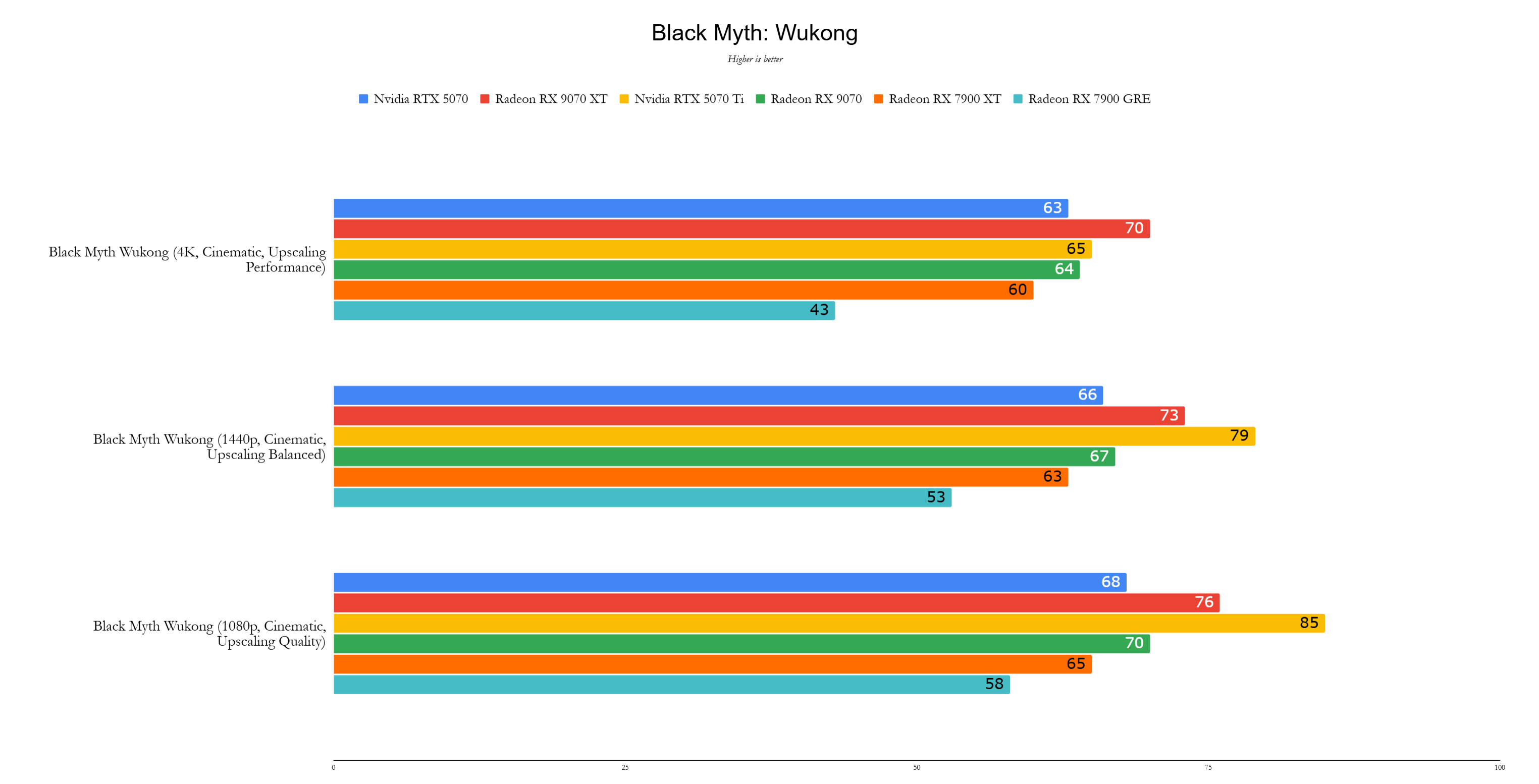 11 Images
11 Images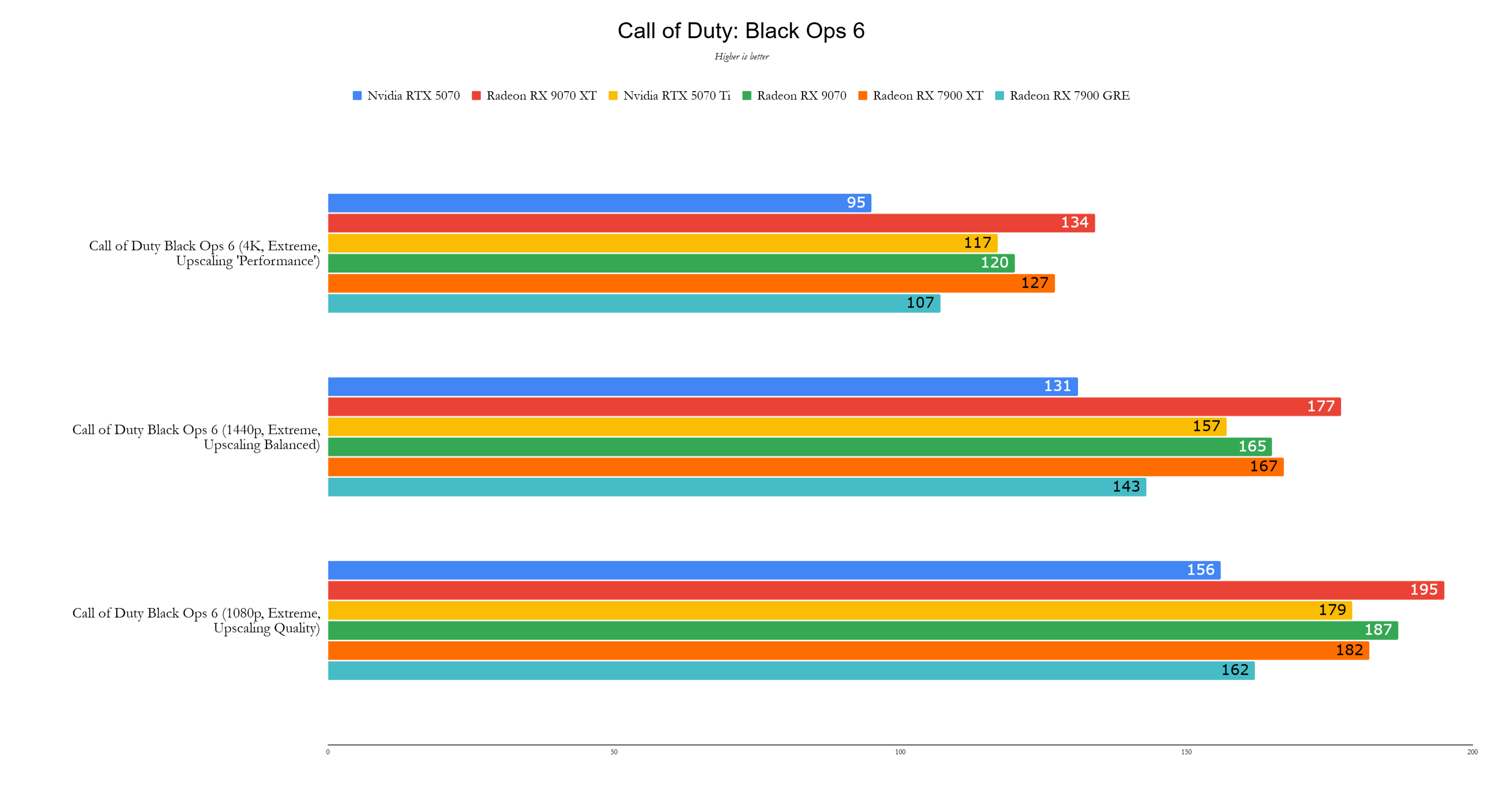
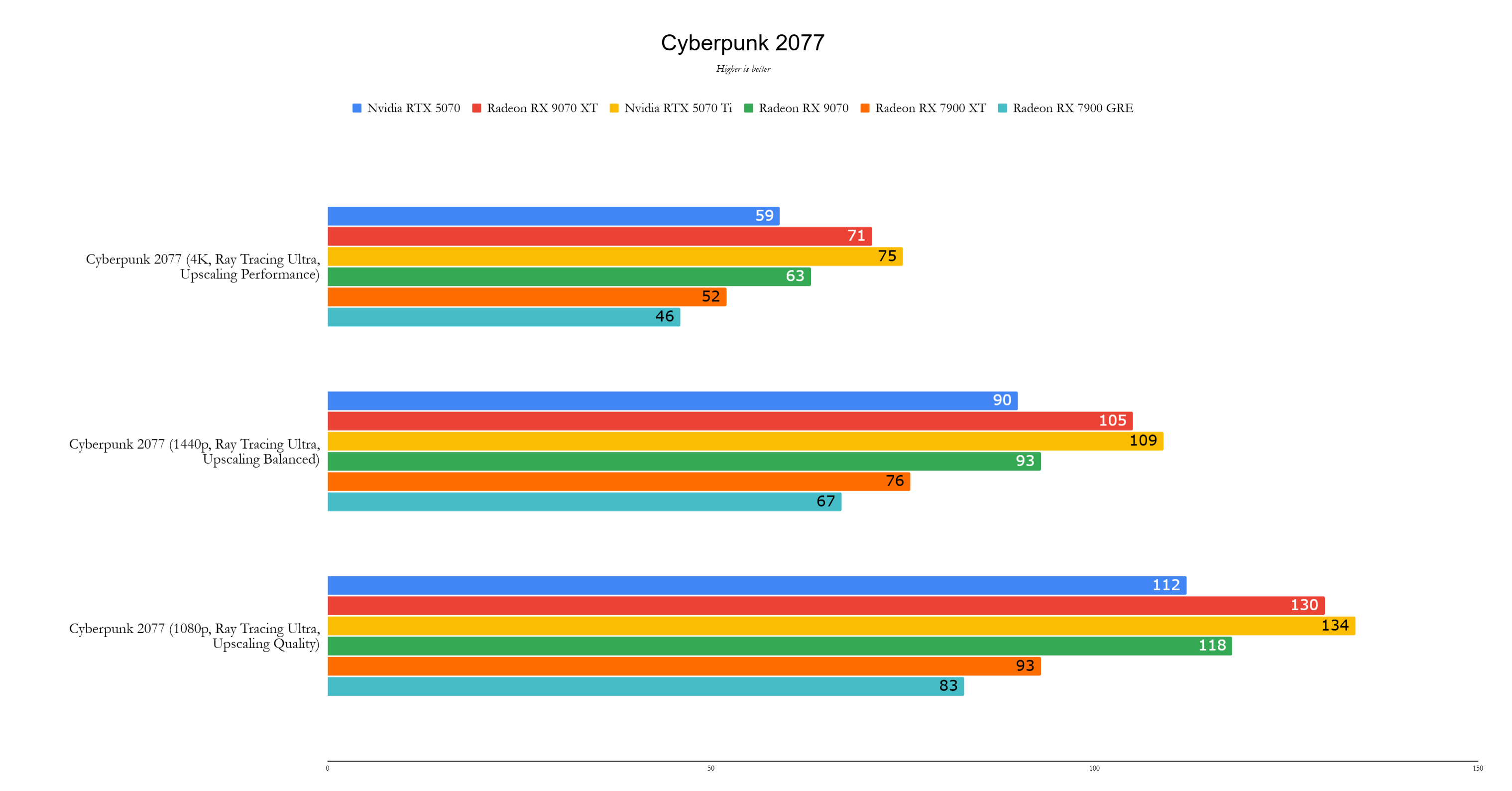
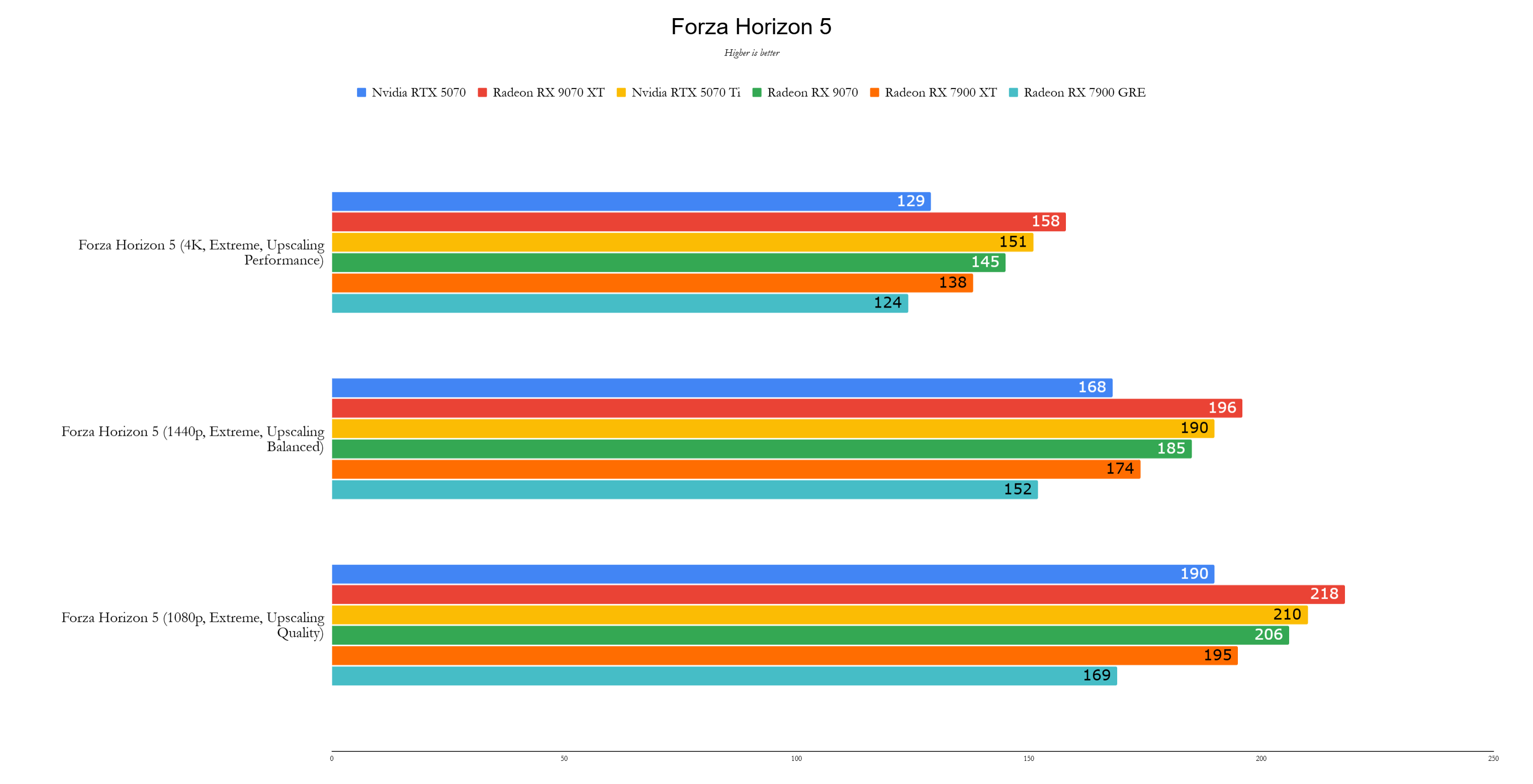
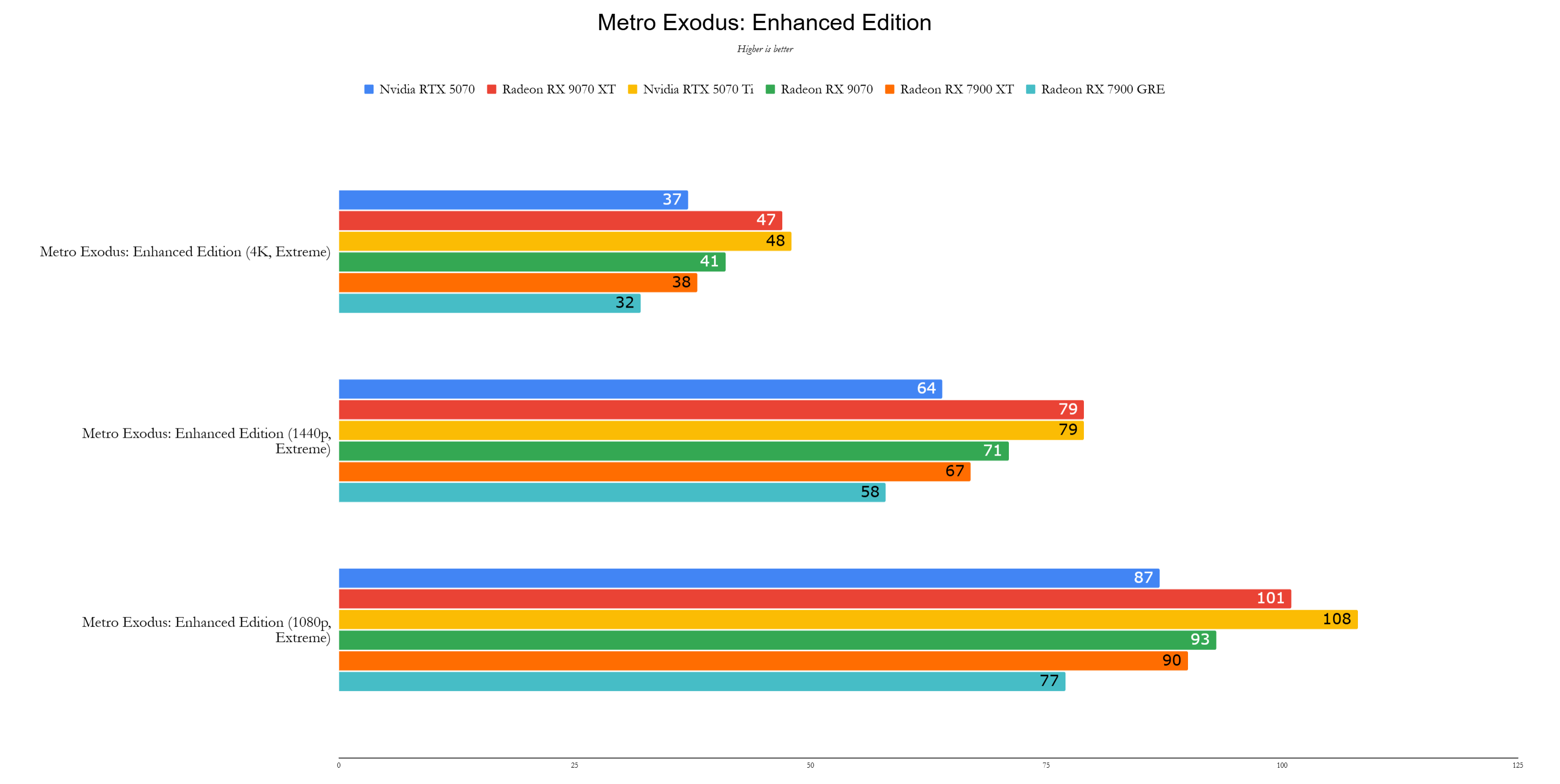
Performance
-----------Priced at $549, the AMD Radeon RX 9070 directly competes with the Nvidia GeForce RTX 5070, often outperforming it. At 1440p, the RX 9070 is on average 12% faster than the RTX 5070 and 22% faster than its predecessor, the RX 7900 GRE, which also launched at $549 in 2024. This represents a significant leap forward, especially considering the RX 9070's 30% fewer cores.
I tested a factory overclocked version of the RX 9070, the Gigabyte Radeon RX 9070 Gaming OC, which has a reported boost clock of 2,700Mhz, a 7% increase. This should translate to a 4-5% performance boost.
All tests were conducted using the latest public drivers at the time of writing: Nvidia cards on Game Ready driver 572.60, AMD cards on Adrenalin 24.12.1, and review drivers for the RX 9070, 9070 XT, and RTX 5070.
In 3DMark, the RX 9070 performs well. In the Speed Way test with ray tracing, it scores 5,828 points, nearly matching the RTX 5070's 5,845. In Steel Nomad without ray tracing, the RX 9070 significantly outperforms the RTX 5070, scoring 6,050 to 5,034, a 20% lead.
Test System
CPU: AMD Ryzen 7 9800X3DMotherboard: Asus ROG Crosshair X870E Hero
RAM: 32GB G.Skill Trident Z5 Neo @ 6,000MHz
SSD: 4TB Samsung 990 Pro
CPU Cooler: Asus ROG Ryujin III 360
In Call of Duty: Black Ops 6 at 1440p with FSR 3 set to Balanced, the RX 9070 achieves 165 fps, compared to 131 fps for the RTX 5070 and 143 fps for the RX 7900 GRE, a 26% and 15% lead, respectively.
Cyberpunk 2077, traditionally favoring Nvidia, sees the RX 9070 outperform the RTX 5070 by 3% at 1440p with Ray Tracing Ultra, a notable achievement for AMD.
In Metro Exodus without upscaling, the RX 9070 averages 71 fps, compared to 64 fps for the RTX 5070, an 11% lead.
Red Dead Redemption 2 using Vulkan shows the RX 9070 achieving 142 fps at 1440p, significantly ahead of the RTX 5070's 115 fps, a 23% performance lead.
In Total War: Warhammer 3, the RX 9070 and RTX 5070 are neck and neck at 1440p, with the RX 9070 at 135 fps and the RTX 5070 at 134 fps.
Assassin's Creed Mirage sees the RX 9070 at 193 fps at 1440p with the Ultra preset and FSR set to Balanced, an 18% lead over the RTX 5070's 163 fps.
Black Myth Wukong, another Nvidia-favored game, results in a close contest, with the RX 9070 at 67 fps and the RTX 5070 at 66 fps at 1440p.
Forza Horizon 5 at 1440p sees the RX 9070 averaging 185 fps, compared to 168 fps for the RTX 5070 and 152 fps for the RX 7900 GRE, a 12% and 25% difference, respectively.
The Radeon RX 9070's launch timing against the RTX 5070 is advantageous for AMD. Both cards are priced at $549, but the RX 9070's superior performance and 16GB of VRAM make it a better long-term investment, despite the RTX 5070's use of GDDR7. Even if performance were equal, the RX 9070's larger VRAM capacity would make it the better value. With its performance edge, the RX 9070 is a clear winner.
-
Solgaleo and Lunala make their grand debutImmersive Supporter cards arriving soonHalf-anniversary celebration with new solo missionsThe stars align as Celestial Guardians arrive in Pokémon TCG Pocket, bringing an spectacular close to the month. LauncAuthor : Alexander Dec 21,2025
-
Untitled Drill Game is a tycoon and idle experience where you extract ore, sell it for profit, and reinvest your earnings to drill even deeper. With so much to discover, a great way to stay informed is by joining the official Untitled Drill Game DiscAuthor : Nathan Dec 21,2025
- Spring Valley Farm Game: January 2025 Redeem Codes
- WWE Superstars Join Call of Duty Warzone: Mobile Roster
- Midnight Girl is a minimalist point-and-click adventure set in Paris in the 60s, now open for pre-orders on mobile
- Mobile Legends: Bang Bang – Best Lukas Build
- "Grand Outlaws Unleashes Chaos and Crime on Android Soft Launch"
- Video Game Song Surpasses 100 Million Streams on Spotify












